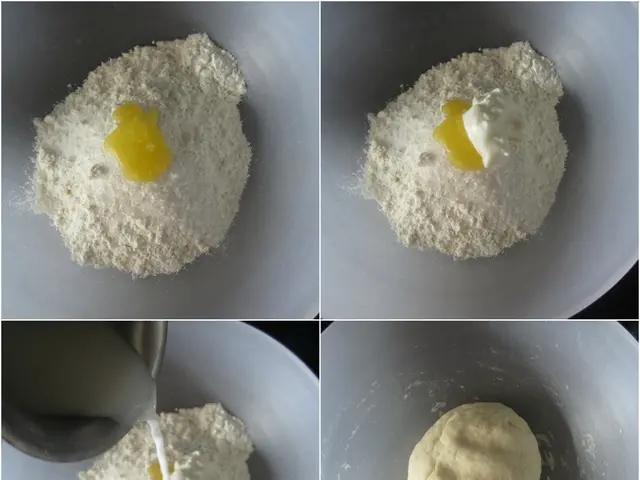Mushrooms and Cancer: A Novel Approach to Fighting Cancer
Anti-diabetic mushroom limitations cancer growth
Who would've thought that mushrooms could be cancer's kryptonite? Yeah, chemotherapy might be what springs to mind when you think about cancer treatment, but there's a lesser-known fungi revolution underway!
Traditional Chinese medicine has been using medicinal mushrooms for tumor therapy for thousands of years. This practice has now caught the attention of modern science, which refers to this as fungotherapy. One of the most important medicinal mushrooms is the Ganoderma lucidum, a.k.a the reishi mushroom.
From keeping fatigue at bay and improving gut health to guarding against diabetes and autoimmune disorders, reishi mushrooms have shown some impressive health perks. A game-changer, however, is their demonstrated ability to block cancer spread and the invasion of healthy tissues. But researchers were puzzled about the exact mechanism behind its powerful effect.
Recent research led by the Hefei Institutes of Physical Science has filled in some of the blanks, revealing how certain acids in the mushroom alter cancer's ability to satisfy its sweet tooth.
Starving Cancer: Cutting off the Fuel
Specifically, the scientists pinpointed Ganoderic acid A (GAA), a bioactive compound extracted from reishi mushrooms with potential anticancer and antidiabetic effects. What they discovered is that GAA binds with glucose transporters, effectively blocking the uptake of sugar. In a subsequent experiment, they saw a significant reduction in sugar uptake in human lung cancer cells, suggesting that using GAA could 'starve' cancer cells, offering a new way to slow cancer growth without affecting healthy cells.
This discovery opens the door for GAA to be developed into a novel therapeutic option, particularly for cancers with high glucose transporter expression.
Mushrooms in the Spotlight
Mushrooms have become quite popular, appearing in coffee blends and even powdered supplements. But if you're undergoing cancer treatment, it's essential to know a few things.
Medicinal mushrooms like reishi, cordyceps, and lion's mane have gained attention for their ability to boost the immune system, decrease inflammation, and potentially aid cancer patients in tolerating chemotherapy and living longer. However, it's crucial to approach their use with guidance from healthcare professionals, as they can behave like drugs and have limits.
According to Santhosshi Narayanan, M.D. from MD Anderson Cancer Center, "While medicinal mushrooms can offer benefits, they contain potent biological compounds, so it's vital to have an open conversation with your healthcare team about the pros and cons and the limitations of the research."
The journey toward understanding the power of medicinal mushrooms in cancer treatment is just beginning, but the potential benefits are promising. With more research and open conversations with care teams, we may unlock new, less toxic ways of fighting this dreaded disease.
Sources:
Starving cancer cells: Researchers unveil new function of ganoderic acid - EurekAlert!
Can mushrooms help during cancer treatment? - MD Anderson Cancer Center
Anti-diabetic effects of Ganoderma lucidum - Phytochemistry
Chaga Mushroom Health Benefits - Cleveland Clinic
Health Benefits of Lion's Mane Mushrooms - Cleveland Clinic
Ganoderma lucidum polysaccharides exhibit immunomodulatory and antitumor activities - Journal of Ethnopharmacology
Ganoderic acids from Ganoderma lucidum inhibit the proliferation of human cervical cancer - Journal of Ethnopharmacology
Immunomodulatory effects of the medicinal mushroom Cordyceps sinensis in vitro and in vivo - Journal of Medicinal Mushrooms
Mycolic acid, a pure triterpene acid isolated from Hericium erinaceus, exhibits antitumor cytotoxicity against human colon cancer cell lines (HCT-116 and SW-480) - Journal of Ethnopharmacology
Hericium erinaceus (Lion's Mane) mushroom mycelium extract improves cognitive function in patients with mild cognitive impairment - Journal of Alzheimer's Disease
Inhibitory effects of a polysaccharide-protein complex isolated from Inonotus obliquus on human hepatocellular carcinoma cell lines (HepG2, Huh7) - Journal of Ethnopharmacology
Medicinal mushrooms and their bioactive components as immunomodulatory, antitumor, and adjuvant agents in cancer treatment - BMC Complementary and Alternative Medicine
Ganoderma lucidum polysaccharides modulate the immune response of human mononuclear cells - Journal of Ethnopharmacology
*Modern science, inspired by traditional Chinese medicine, is exploring the potential of medicinal mushrooms like reishi in integrative medicine, specifically focusing on their anticancer properties.* Recent research has revealed that Ganoderic acid A, a bioactive compound from reishi mushrooms, can bind with glucose transporters, potentially starving cancer cells and offering a novel approach to slow cancer growth.* Incorporating medicinal mushrooms into a health-and-wellness lifestyle, especially during cancer treatment, can be beneficial, but it's advised to consult healthcare professionals due to their potent effects and potential interactions with other medical-conditions and treatments.








